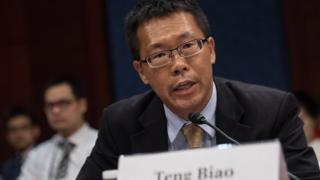
Exiled Chinese human rights activist Teng Biao has apologised to a female journalist in Taiwan as the MeToo movement picks up momentum there.
The woman claims Mr Teng tried to rape her during a work-related trip in 2016. In a statement released on Wednesday, Mr Teng said the rape allegations were baseless but apologised.
He said the encounter was a “clumsy courtship” and not an attack.
Mr Teng left mainland China in 2012 and has been living in the US since 2014.
The Taiwanese journalist, who prefers to not be named, says Mr Teng lunged at her in a hotel room in India in 2016.
She told the BBC that she had needed to extend her stay after the official schedule finished, and Mr Teng offered her a room that he claimed was already paid by some acquaintances who had left earlier than planned.
She alleges that when she entered the room, she had found Mr Teng sitting there.
“He lunged at me multiple times, I pushed him away. He then came at me again while I walked to the door so I withdrew to the corner,” she told the BBC.
“I said ‘don’t you come, or I’ll scream’. He didn’t want others to hear so he had to let me go,” she added.
In an email reply to the BBC, Mr Teng said he had “strong evidence that [shows] a rape attempt accusation is baseless” although he didn’t elaborate. Mr Teng resigned from two human rights groups after issuing the apology.
The journalist says that she had asked him to apologise publicly after the incident. She added that Mr Teng had agreed to do so, but several of their mutual acquaintances asked her to stop pursuing a public apology as they feared it would give other people a chance to discredit their work on human rights.
“The organiser of the trip asked me ‘why are you giving me trouble’?” she recounts. “It made me feel ashamed.”
The latest wave of MeToo allegations in Taiwan made her realise “the wound is not healed”, she added.
So she reached out to Mr Teng two weeks ago asking for a public apology, which prompted him to put out a statement on Wednesday.
The statement, posted to Twitter and Facebook, stated that Mr Teng was “extremely guilty” for the damage she suffered.
“I have apologised to her many times privately and I will further make an apology publicly today: Sorry, I hurt you,” it added.
He further said that to his memory he didn’t lunge at her or stop her from leaving the room.
A prominent human rights lawyer in China, Mr Teng was known for challenging abuses of power by the Communist Party. He was also formerly a lecturer at the China University of Political Science and Law.
He was detained for 70 days in 2011, and left mainland China in 2012. He previously said he didn’t dare return because of the Chinese government’s crackdown on human rights.
Now in the US, he has been vocal about China’s suppression of human rights issues. According to his Twitter account, Mr Teng is now the Hauser Human Rights Scholar at Hunter College of City University of New York and Pozen Visiting Professor at the University of Chicago.
The MeToo movement has spread across Taiwanese society since late May, with more than 140 allegations being made against people including politicians, doctors, professors and celebrities.
Prominent Tiananmen protest leader Wang Dan was among those accused. He denied sexual assault allegations from two young men earlier this month. One of those men has launched a lawsuit alleging rape. Mr Wang has resigned from a faculty position, and said he will return to Taiwan from the US to fight the case.
Earlier this week, famous TV show host Mickey Huang Tzu-Chiao was admitted to hospital with self-inflicted injuries after apologising to his accuser over an Instagram livestream session. He has reportedly been discharged and is currently stable.


